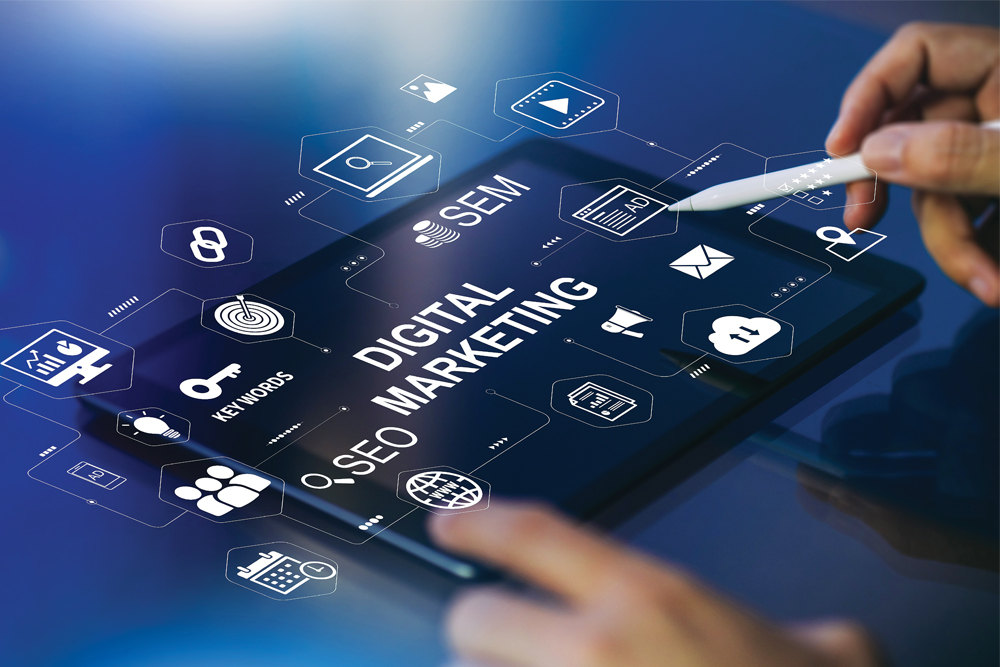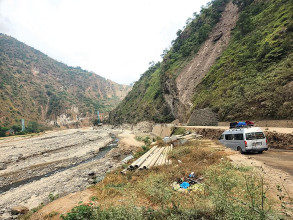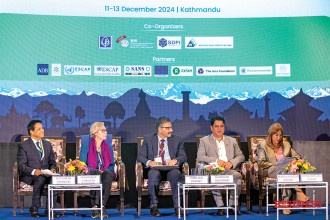
Digital marketing from being an advantage has become a necessity in today’s economy. A strong digital marketing presence is no longer a choice for businesses or political parties. With the right digital marketing strategy, you can target potential customers anywhere in the world, open doors to new markets and build your brand and your success. The key, however, is in knowing what works.
Digital marketing tools allow you to target users based on demographics, interests, online behaviour and even purchase history ensuring your message resonates with the right people, maximising the impact of your marketing efforts. Social media platforms and other digital channels enable two-way communication, allowing you to connect with your audience on a deeper level. Unlike billboards or flyers, digital marketing campaigns provide a wealth of data and analytics. You can track website traffic, engagement on social media posts, and even measure the effectiveness of individual ad campaigns to see what is working and what is not, allowing you to optimise your strategy and maximise your return on investment.
All of this, while being cost-effective and scalable. Digital marketing offers a wider range of budget-friendly options compared to traditional advertising. You can start small and scale your campaign as your business grows. Additionally, many digital marketing tactics, like content marketing and social media engagement, can be highly effective even with limited resources. By leveraging the power of digital marketing, businesses can connect with their target audience in a meaningful way, build strong brand loyalty, and achieve sustainable growth.
One of the first business houses to have an in-house digital marketing team was Syakar Trading Company, the authorised distributor and retailer of Honda in Nepal. Their Business Development Manager, Nijen Lal Shrestha, speaks about their foray into digital marketing. “When we started, digital marketing was a very small thing. Most of it was limited to boosting posts and replying to comments. Later, we had a few meetings with the top management, after which when we looked deeper, we found that digital marketing is really vast, and what we had been doing up till then was not really enough. Which is why we felt that we should have our own digital marketing team because we did not want to have any conflict of interest.”
Does having an in-house team provided a sizable advantage? He says, “The reason we went forward was because we could see us getting an edge. As far as I know, no one has been doing digital marketing as well as us. I cannot comment on the specifics but we have been making actual sales from digital marketing. We have our own call centre for digital marketing, to call leads and filter them. Everything to do with the funneling process, we are doing in-house. So, we have a very huge advantage in digital marketing. Our brand’s positioning is very good in digital marketing.”
Speaking about how the knowledge for digital marketing was developed, he responded, “Initially we had to self-study digital marketing. To find out what digital marketing actually is, we took a three-month course. Later, we passed on our knowledge to other members of our team.”
Talking about if there is a specific platform which works best in Nepal for Honda, he answered, “Every platform has its own advantages. If we have videos then it performs very well on Instagram through reels, on Facebook instead of reels other posts work better. We do not have something we thoughtlessly repeat and something we avoid entirely. But most of our leads come from Facebook, then the Google platforms and then Instagram. We have been on every platform, but there is not something we narrow our focus on, everything has its own perks.”
Many businesses are not fortunate enough to have an in-house digital marketing, they often avail the services of digital marketing agencies. While speaking to Arun Patel, Digital Media Strategist of Pedal Advertising and Digital Marketing, a professional with almost two decades of experience in the field, he said, “Compared to when I started, the importance given to digital marketing has increased exponentially. Though disregarded in the past, a digital presence is paramount now. Almost every business has some kind of presence.”
In regard to how well people truly understand the importance of digital marketing, he says, “When it came to more traditional media like newspapers and television, their reach was based on their circulation only. Currently, the data available to us about the reach is far more detailed. We can see how many have seen the post and how many interacted with it in any capacity. So, people understand that they can get their content to very specific people. But the exact scope of it has not been understood, and is unfortunately limited to posting on platforms like Facebook and Instagram. It extends beyond that.”
Patel took up Business Studies, worked in advertising and went on to hone skills in digital marketing through hands-on experience, starting from the most basic level. Talking about the availability of manpower, he says that videographers and video editors are easy to come by. “There are also a lot of people who take three-four-month courses in digital marketing and are looking for jobs. It is difficult to find people who have the necessary expertise from the get go. So, we hire such people and have to train them on the job,” he shares.
We also spoke to Prajwal Karki, who calls himself an expert in the field of digital marketing. Founder of Click Dribble, a digital marketing company based in Nepal, Karki is a digital marketing teacher at institutions like UpSkills Nepal, which he co-founded. With over ten years of experience, more than 300 students taught, a bonafide veteran in the field, he has a background in Business Administration. While the subject is relevant, Karki had to pick up the specifics of digital marketing through courses on platforms like Udemy, an online learning platform.
Asked about how most digital marketers get the required skills, he responded, “Most research by themselves in the first phase about what digital marketing really is. Then they look for good training institutes to polish the skills their self-taught skills. Just learning up to this point, leaves them capable to take on the various work opportunities of the booming digital marketing industry.”
Karki said that the industry is growing and there are a lot of career opportunities available whether you want to work with an agency or business house or freelance. “Most start as interns, gain experience and build their careers. The market is in a nascent stage and good human resources is hard to find”. However, he warns that there are many institutes that offer online and offline courses that are more of a scam than anything. He shares that it is important to learn from the right source.
Karki, on the topic of market size says, “A big limitation in Nepal is that our market size is small. All our digital marketing channels are international, there is nothing Nepal-made, making a lot of the services difficult and expensive to avail. A lot of the problems are also industry specific. The product industry generally narrows their focus only to social media campaigns, whereas the service industry goes in for advertising on Google and other search engines.”
Today, for the larger businesses in the country, the format is to use their advertising agency which now also has a digital wing for their digital marketing requirements or to collaborate with content creators.
One of the biggest impacts digital marketing has had is in the field of politics. It helps with leveraging demographics, interests, online behaviour and even geographic location, for campaigns to craft laser-focused messages that resonate with specific segments of the electorate. Voters today crave authenticity and connection. Digital marketing allows campaigns to craft a compelling narrative around the candidate and their positions. Unlike traditional campaigning methods, digital tactics offer a treasure trove of real-time data. Campaigns can track website traffic, social media engagement metrics, and even the effectiveness of individual online ads. Digital marketing isn’t just about swaying opinions either; it is about mobilising supporters and raising crucial funds. Social media platforms and email marketing are perfect for rallying the base, encouraging voter registration, and driving traffic to fundraising pages.
A conversation with Bigyan Gautam, a Campaign Coordinator for Rastriya Swatantra Party, reveals how the general opinion of digital marketing among political leadership has changed. “In the 2074 elections, digital marketing was not a prominent feature. Most people over 45 were not on social media. But for the 2079 elections, we saw that children convinced their parents to go on social media. There was a decisive shift of media consumption of people preferring their phones over the usual newspapers and television. Older politicians did not believe in the power of social media until 2079, but with people like Balen Shah winning elections through mostly online campaigns, they cannot afford to ignore social media again for the next election, and I do not believe they will have the luxury to do so ever again.”
In regard to what their focus was in running a successful campaign he mentioned, “Our efforts were focused on studying the candidates and making an easily consumable summary about them, their background and their plans after winning. We used TikTok a lot and ended up creating at least a few accounts for each candidate so that their messages and plans would have enough reach among the public. We also collaborated with a lot of YouTubers, mainly those who report on news, where we would record the events we hosted ourselves and send the footage to various YouTube channels so that they could use it to report on our events. While bigger parties focused on going to the place physically as much as possible, we and our social media campaigns were able to reach places no one else could.”
A unique struggle that digital campaigns seem to face is gaining legitimacy in the eyes of the public. “A lot of the other parties conducted very big events in Kathmandu. We had conducted a digital campaign. But people need to actually see a crowd of people to believe a party is real. Social media alone does not have complete legitimacy in the people’s eyes and people need to see actual movement on the ground. So, we conducted many events, the most prominent being in Chitwan. Strategically our party’s President was also running from Chitwan, and the party’s popularity was in areas like Chitwan, outside of Kathmandu,” he revealed.
“The main aim of the event was to establish legitimacy that our party was not just digital but a real one. The visualisation that there are actual people supporting us was very important to establish that we were not only a digital campaign. And we were able to do this naturally, we did not have to hire cars to bring people to the rallies, we had not forced anyone to be there, just good marketing about the fact that the rally was happening and everyone showed up of their own volition,” explained Gautam.
The rise in popularity of digital marketing to promote political campaigns required entities like the Election Commission to adapt as well. The Election Commission’s Spokesperson, Raj Kumar Shrestha, revealed some steps the commission had taken to address these advances in political campaigns. “During the elections, to make sure that the promotion that the candidates engage in does not go against various societal and legal rules we have a social media monitoring team. The rules that political parties follow are always going to be there. But it definitely gets more complicated during the election and campaigning period, for which the commission establishes a task force to properly handle any problems,” he said.
He added that the team is formed during the elections and it does not exist otherwise because it is not necessary. “We had experts from various fields on the team and also focused on tracking the posts. Other than that, we also work alongside social media companies like Meta and Viber to combat fake information and misinformation,” he shared.
Shrestha emphasised that the commission hires experts working in different fields of technology as a lot of focus is also on cybersecurity and valid information. “It ends up being a question of what to capture, as it has to be related to the elections. There are generally two things, firstly a candidate, while campaigning, might present fake information to make themselves seem better or make their opponent seem worse, or someone might disseminate some fake information about the election commission itself. To tackle this the commission gets experts to monitor this using certain software that catches such posts by filtering specific words, on the basis of which posts are monitored,” he elaborated.
“To properly codify these rules, the Election Commission publishes the ‘Policy on the use of Social Media in Electoral Management’, a detailed rulebook on the do’s and don’ts, before major elections. The necessity to create such a rule book solidifies the internet as the upcoming arena for major political battles,” said Shrestha.
These conversations have made it clear that Nepal’s digital marketing landscape is an interesting mix of opportunities and challenges. Mobile and internet usage in Nepal is on the rise, creating a larger audience for digital marketing efforts. Nepalis are particularly active on social media platforms like Facebook and Instagram, and digital marketing offers a wider range of budget-friendly options compared to traditional advertising.
Despite this we cannot ignore that while internet penetration is growing, consistent access to high-speed internet can be a hurdle, especially in rural areas, a significant portion of the population still lacks the digital literacy required to fully engage in online activities, e-commerce is still in its early stages of development in Nepal, and digital marketers have yet to gain consumer trust amid security concerns.
The digital marketing field in Nepal is still maturing, and there might be a lack of skilled professionals readily available. Despite these challenges, Nepal’s digital marketing landscape offers exciting opportunities for businesses willing to adapt. By understanding these hurdles and implementing creative solutions, businesses can navigate the Nepali digital space and achieve success.






